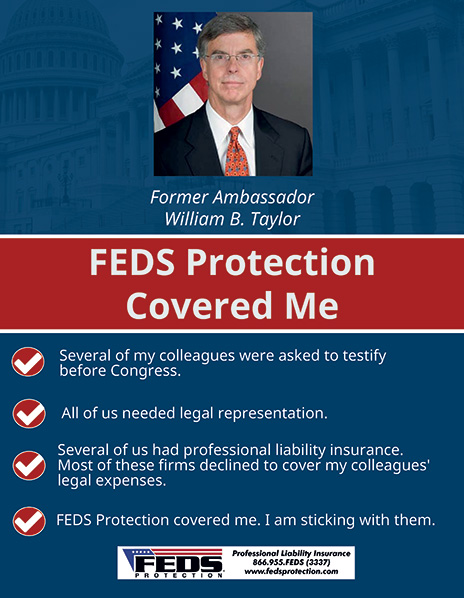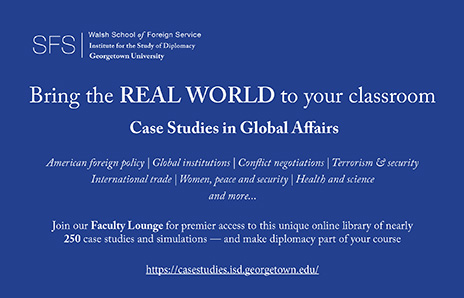Human Rights Today: A Q&A with Stephen J. Rapp
A veteran prosecutor weighs in on the state of the project to establish and protect human rights around the world.
Editor’s Note: Stephen J. Rapp has been at the leading edge of promoting human rights for years, including through prosecuting war criminals in Rwanda and heading State’s Office of Global Criminal Justice. In this insightful and wide-ranging interview with the FSJ, Rapp discusses how to raise sensitive human rights issues in diplomacy, how to carefully balance human rights with national security interests, and why human rights must be an enduring feature of U.S. foreign policy.

With the world at war, President Franklin D. Roosevelt delivers his State of the Union address, remembered as the “Four Freedoms” speech, to a joint session of the U.S. Congress on Jan. 6, 1941. Seated behind Roosevelt are Speaker of the House Sam Rayburn, left, and Vice President John N. Garner.
AP Photo / George R. Skadding

An engraving of the “Four Freedoms” at the FDR Memorial in Washington, D.C.
Wikimedia Commons / Another Believer / CC by SA-3.0
In a pragmatic bipartisan foreign policy that balances the pursuit of our national interests with the preservation of our fundamental values and principles, what role should the defense and protection of human rights play in our relations with other countries?
The U.S. commitment to human rights, and our support for their protection through international norms and law, is essential to our ability to bring together and lead global efforts to confront a range of challenges that threaten us all. You see it in international meetings where countries want to work with us. Some countries are becoming more economically dependent on China, but they still prefer to be at our side. It is only when we act inconsistently with human rights or violate international norms ourselves that we lose them and harm our effectiveness.
Of course, all governments are obligated to give the highest priority to protecting their own citizens; and when they act abroad, they will need to justify these actions as serving this priority. While U.S. administrations led by both parties have taken positive steps to protect human rights across the world, I think that they have all fallen short when it comes to building popular support for these actions as essential to the interests of the American people.
What is your definition of human rights? Is the Universal Declaration of Human Rights still the fundamental document for human rights work? What bearing does the U.S. Constitution have in this? Is there any particular order of priority in promoting and defending particular human rights, or should there be? (For example, the current administration has focused on religious freedom; is that a reasonable stance?)
I think that the Universal Declaration of Human Rights of 1948 says it all very well. From an American point of view, the UDHR answered the summons of President Franklin Delano Roosevelt’s “Four Freedoms” speech of 1941, where he called for universality in the repeated phrase “everywhere in the world,” and where he went beyond political rights to economic ones with the inclusion of “freedom from want,” suggesting that governments should act to meet the basic needs of their citizens.
The UDHR was ultimately implemented by two international covenants in 1976. The first, the “International Covenant on Civil and Political Rights,” restrains government action in ways consistent with the U.S. Bill of Rights. The second, the “International Covenant on Economic, Social and Cultural Rights,” requires government action like U.S. political leaders pushed during the eras of the New Deal and Great Society. The United States ratified the first covenant but was almost alone in not ratifying the second. As U.S. officials, we must live with that; but it does require us to make the case that protection for political rights yields responsive governance that is better at delivering “freedom from want.”
My own work has focused on the protection of the most fundamental rights to life and physical integrity, and on the prosecution of those who violate these rights through the commission of mass atrocities. It sometimes seems that my priority is on putting people in jail, while other human rights actors’ priority is on getting people out. But my colleagues recognize that accountability is fundamental to protecting human rights. And I recognize that the less violent deprivations of rights—denial of free expression, association, assembly and of procedural safeguards in criminal cases—open the way for mass atrocities.
I am okay with the present emphasis on religious freedom, particularly as so many of the mass atrocities in today’s world are being committed on a sectarian basis—against the Yezidis in Iraq, the Rohingya in Myanmar and the Uyghurs in China, for example. At a time when global tides are running in the wrong way, a high-level and active commitment to religious freedom can be wind in the sails of human rights. Of course, I would want to tack in a direction that would ensure that this freedom is protected along with the others.
Should the United States pursue an expansive vision of human rights at home and abroad—more rights for more people moving forward—regardless of cultural context or social and political consensus among our friends, allies, partners and/or strategic rival states? Should our human rights agenda in a bilateral relationship vary from country to country, and if so, what are the determining factors?
We cannot whitewash violations, even by governments whose help we need, and maintain credibility and the broader benefits that come with a values-based foreign policy. Raising such violations can be difficult in our bilateral meetings, but they must be on the agenda, though our position can be delivered with the acknowledgment that every country, including ourselves, has had to deal with similar issues.
I think that one can also pitch the practical benefits of improving protection for human rights. I know that this is difficult when you are talking to a guy whose forces have committed mass crimes, but I will admit to suggesting to leaders that the best way to avoid an international arrest warrant would be to pursue genuine investigations and prosecutions of direct perpetrators. If that happens, it will at least be harder for such leaders to recruit others to commit similar crimes in the future.
Of course, sometimes the requirements of national security require us to work even with criminal leaders. Roosevelt and Churchill allied with and aided Stalin in order to beat Hitler. But in less extreme situations, we often shoot ourselves in the foot by allying with leaders who are mistreating their own people. I remember when it was said that Nicaraguan dictator Anastasio Somoza was “an SOB, but our SOB” and recall how the shah of Iran was feted by U.S. administrations of both parties. They were hated at home and eventually overthrown, and we have been unable to accomplish much for the people of either country since.
I think that the Universal Declaration of Human Rights of 1948 says it all very well.
What are the benefits or pitfalls of the Trump administration’s aims to focus more narrowly on the defense and protection of core “unalienable” rights as opposed to a broader basket of identities, activities and liberties? What is your view of the Commission on Unalienable Rights established by Secretary Mike Pompeo in 2018? What advice would you offer the commission, if asked?
I was scheduled to see the Commission on Unalienable Rights at Chatham House in London at the end of April. If the meeting had taken place, I would have encouraged a broader view of human rights, both because of the relationship of these rights to each other and because of the need for allies who take a broader view and whose support is necessary if we are to make progress on the international protection of any of them.
What is the prospect of the U.S. continuing to lead the international human rights agenda in light of current political challenges at home and abroad?
The Pew Research Center tells us that support for U.S. leadership by citizens of our European allies has fallen precipitously since 2016. Sadly, the polling also shows less dramatic, but still significant declines in favorable views of the United States itself. But at the same time, European voters do not strongly support their own politicians when they advocate for human rights or values-based foreign policies. In the past, however, when we led, others joined us in part because of the favorable views of the United States by their citizens. In the future, it will be more difficult, and more costly.
When you were Ambassador-at-Large for War Crimes Issues in the Office of Global Criminal Justice, what were the top U.S. foreign policy goals in the realm of human rights? Has that changed now, and if so, how?
Let me cite one difference, and it is not only between this administration and the last one, but between the current one and the last two.
In the past, we made it a high priority of the U.S. government that leading alleged war criminals face trial in international courts. In 2001 the George W. Bush administration refused to participate in a donors’ conference in Belgrade unless former Yugoslav President Slobodan Milosevic was transferred to The Hague. In 2006 President Bush himself refused to meet the president of Nigeria until former Liberian President Charles Taylor, then in exile in Nigeria, was arrested and sent for trial by the Special Court for Sierra Leone where I was Prosecutor.
From 2009 to 2011, the Barack Obama administration engaged on multiple levels, with both carrots and sticks, to successfully bring the last of the indicted war criminals of the former Yugoslavia, including Serbian Army General Ratko Mladic, to international courtrooms where they would face the survivors of crimes like the murder of 8,000 Muslim men and boys at Srebrenica.
Now there is the case of former Sudanese President Omar Hassan Ahmad al-Bashir, who is under an International Criminal Court arrest warrant for genocide and crimes against humanity, and who was overthrown in April 2019 and soon thereafter jailed on corruption charges in Khartoum. There has been justified fears that he will break out and destabilize the fragile transition, and even the military elements of the transitional government have wanted him gone.
Is there any doubt that if the United States exercised its former leadership, he would not have soon been on a plane to The Hague?
Read More...
- “From Immunities to the Afghanistan Decision – Talking International Criminal Justice with Stephen Rapp,” Angela Mudukuti, OpinioJuris, September 25, 2019
- “What Justice is Required before Aid to Syrian Reconstruction?” by Stephen Rapp, Justice in Conflict, April 29, 2020
- “Top War Crimes Diplomat Stepping Down,” by Colum Lynch, Foreign Policy, January 15, 2015




